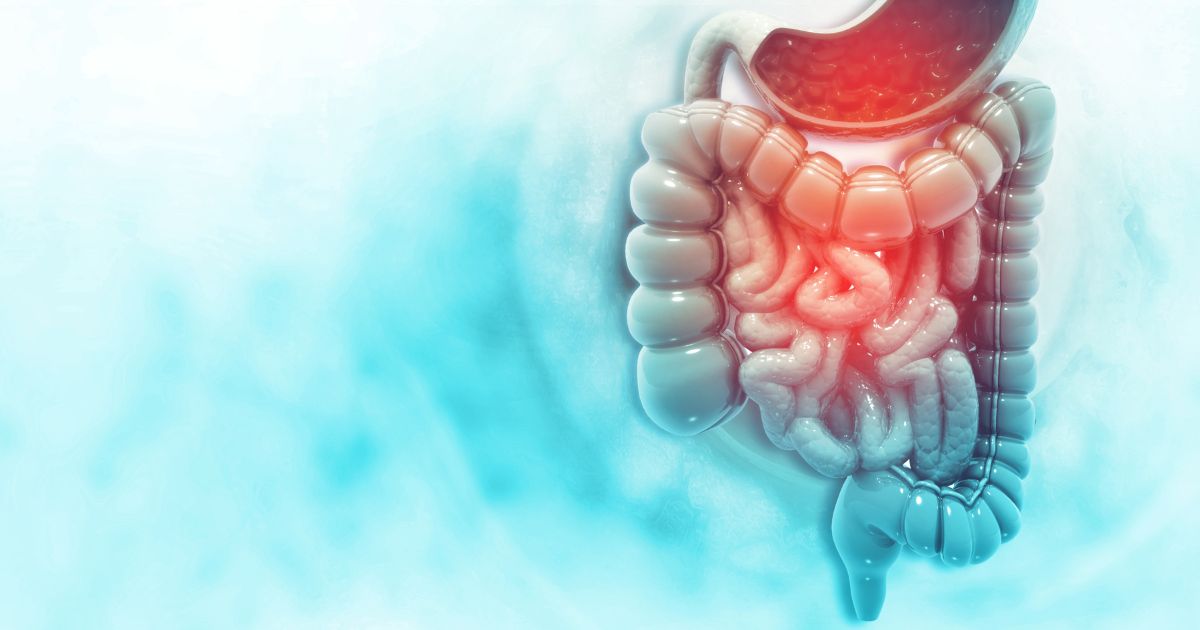Introduction To Digestive Health
Importance Of A Healthy Digestive System
Our digestive system is a powerful engine that helps keep our bodies running efficiently. It doesn’t just digest the foods we eat — it absorbs nutrients needed to fuel every cell in our body, helping to promote energy – all while expertly removing waste.
A healthy digestive system also plays a key role in supporting our immune system. A healthy digestive system can help contribute to a happier and healthier life.1
Common Signs Of Poor Digestion
An unhealthy digestive system, on the other hand, can create all kinds of issues – heartburn, excessive flatulence, bloating, constipation, and diarrhea. Then, there are the issue outside of the digestive tract that can manifest – fatigue, skin rashes, weight fluctuations, and troubled sleep.2
While digestive distress after a meal is quite common, persistent issues may be a sign that you need to make some dietary or lifestyle changes.
Basics Of Digestive Health
Understanding The Gut And Its Functions
The gut, or gastrointestinal system, is a complex network of organs that includes the stomach, small intestine, and large intestine. It’s responsible for breaking down food and absorbing essential nutrients for your body’s growth and energy.
It’s a pretty remarkable system that uses the skill of digestive juices and billions of beneficial gut bacteria to break down food into nutrients that can be absorbed into your bloodstream.3
Maintaining digestive health is <u>absolutely crucial</u> for overall well-being. Research shows there’s a strong link between gut health and your immune system, mental health, cardiovascular health, and sleep.4
The Mindblowing Role Of The Microbiome
One of the greatest contributors to gut health is your microbiome – a bustling community of about 200 species of bacteria, viruses, and fungi that live in your large intestine. And more specifically, this ecosystem includes the “good” microorganisms that help keep that microbiome healthy and balanced.
These “friendly gut bugs” help to break down food, turning it into nutrients your body can use for energy. They also play a vital role in regulating the delicate balance between beneficial and harmful bacteria in the gut and preventing the overgrowth of potentially harmful bacteria. This balance helps support digestion, but it also plays a role in helping to support a strong immune system.5
A healthy microbiome has also shown promise in helping with digestive and bowel issues and supporting mood and mental health by influencing the connection between our gut and our brain (the gut-brain connection).6
This impact on both physical and mental health makes the microbiome a truly mind-blowing element in our biology.
Foods For Healthy Digestion
Beneficial Foods For Digestion: Fiber-Rich and Probiotic-Packed
Foods rich in fiber greatly contribute to healthy digestion. Eating plenty of whole fruits and vegetables (as opposed to drinking juices) lets you take full advantage of their high fiber content.
You should also try to “eat the rainbow,” which means including a variety of colors on your plate, like greens, reds, oranges, and yellows. Different colored produce provides different types of vitamins and nutrients that are each vital for your body.7
In addition to fruits and veggies, it’s best to also consume more “prebiotic fibers” in your diet. These feed your friendly gut bugs and keep them thriving. Common sources of prebiotic fiber include chicory root, apples, onions, asparagus, Jerusalem artichoke, garlic, leeks, and even dandelion greens. Unripe green bananas have prebiotic effects.8,9
This brings us to probiotic foods. Probiotics are active, live friendly bacteria that can help keep your gut well-balanced. They help to increase the “good” gut bugs in your digestive system. Some of the most common probiotic foods include yogurt, kefir, sauerkraut, tempeh, kimchi, miso, kombucha, and certain cheeses. You can also find probiotics in supplements.10
Foods To Avoid For A Healthier Gut
Maintaining a healthy gut is vital for your overall well-being, and there are certain foods you’ll want to avoid or limit to help keep your digestive system in good shape.
One group of foods to avoid: sugary treats and drinks. High-sugar foods, like candies, soda, and sugary cereals, can feed harmful bacteria in the gut, leading to a gut imbalance and serious health issues down the line.11
You’ll also want to try and avoid highly processed foods, which often contain artificial additives, preservatives, and unhealthy fats. These “ultra-processed” foods can disrupt the balance of beneficial bacteria in the gut and may lead to discomfort or stomach problems.12
Additionally, it’s a good idea to reduce consumption of foods high in saturated fats, such as fried foods, fatty cuts of meat, and full-fat dairy products. These can be harder for your gut to process and may contribute to irritation.13
Finally, foods that are high in artificial sweeteners, found in many diet products, can also negatively affect gut health.14

Rituals For Good Gut Health
Incorporating Gut-Supporting Nutrients Into Your Diet
A diet rich in gut-supporting nutrients can help support digestive health. To recap:
Eat more:
- Dietary Fiber: Vegetables, fruits, legumes, whole grains, nuts, and seeds.
- Prebiotics Fiber: Chicory root, apples, onions, asparagus, Jerusalem artichoke, garlic, leeks, dandelion greens, unripe green bananas.
- Healthy Fats: Monounsaturated and polyunsaturated fats from avocados, nuts, seeds, olives, and fish, like salmon and mackerel.
- Probiotics: Yogurt, kefir, sauerkraut, tempeh, kimchi, miso, and kombucha are excellent sources of probiotics.
- Polyphenols (antioxidants): Dark chocolate, red wine, green tea, almonds, and certain fruits, such as berries and grapes.
Remember to consult with a healthcare professional before making any significant dietary changes. It’s always best to personalize any dietary changes.
The Importance Of Mindful Eating
Mindful eating is a simple concept, yet it can drastically transform your relationship with food and potentially have a positive impact on digestion.
Mindful eating is the practice of fully focusing on the experience of eating – the flavors, textures, aromas, and visual appeal of the food on your plate.
Mindful eating has two significant potential benefits on digestion. Firstly, it can help prevent overeating. Eating rapidly often leads to consuming too much food too quickly, causing digestive discomfort, like bloating, gas, and indigestion. By slowing down, you can listen to your body and stop eating when you’re truly full.15
Secondly, mindful eating prepares the body for digestion. The brain has the time to initiate digestion by signaling the release of saliva and other digestive enzymes when you take time to pause and appreciate your food. Mindful eating can also evoke feelings of calm, easing stress – a common cause of digestion issues.16-17
So, the next time you sit for a meal, slow down, engage with your food, and savor every bite.
Impact Of Hydration On Digestion
Hydration is key to virtually all body functions, including digestion.
In fact, digestion starts with saliva, the foundation of which is water. Water is also necessary to help you digest soluble fiber, and it helps your bowels to make well-formed, soft stools that are easy to pass.18
Drinking water during meals can also help digestion, particularly chewing and swallowing, as it helps to soften food and move it down the throat. There is no truth to the rumor that drinking water at mealtime interferes with digestive juices.19
You can also add more water to your diet by incorporating water-rich fruits and vegetables, like lettuce, leafy greens, cucumbers, bell peppers, summer squash, celery, berries, and melons.20
Exercise And Digestive Health
How Moving Aids Digestion
Regular exercise can be incredibly beneficial for your gut health.
For one, physical exercise can help food travel more easily through your digestive system. That’s why it’s a good idea to go for a walk after a big meal. The movement can aid in stimulating digestion and help ease that feeling of bloating.21,22
Research also suggests that moderate exercise, such as brisk walking, may help ease certain digestive issues, including constipation.23
However, it’s essential to be mindful of your body’s needs and limits.24
Managing Stress For Better Digestion
Effect Of Stress On Gastrointestinal Health
Stress can profoundly influence gut health.
To begin with, it can either cause the digestive system to go into overdrive or slow considerably, potentially leading to issues like heartburn, stomach discomfort, bloating, constipation, or diarrhea.25
This highlights the importance of the “gut-brain axis” – the remarkable signaling system between the gut and the brain.
On this two-way highway, stress or anxiety can lead to an upset balance of bacteria in the digestive tract and, therefore, gut issues. In turn, gut issues can affect signaling to the brain, affecting mood and mental health and focus. It’s quite a “chicken or the egg” scenario.26
So, finding ways to manage stress effectively is critical to maintaining a healthy gut, and overall health.
For those dealing with chronic high stress or anxiety, it might be beneficial to consult with a healthcare provider or a mental health professional.
The Role Of Sleep In Digestive Health
The Relationship Between Sleep And Digestion
Clinical research strongly supports the connection between sleep and digestion. Just as with stress, the gut appears to influence sleep patterns, and sleep impacts the health of our gut.27
It appears that inadequate or poor-quality sleep may disrupt the gut microbiome, while good gut health may enhance sleep quality. 28
Given its significant potential impact on gut health, prioritizing quality sleep is incredibly important. <a href=”https://www.thensf.org/how-many-hours-of-sleep-do-you-really-need/”>The National Sleep Foundation recommends</a> adults aim for 7-9 hours of quality sleep per night for optimal health.
If you struggle with ongoing sleep issues, consult with a healthcare provider.

Gut Health Is Everything
Final Thoughts On Healthy Habits
Supporting healthy digestion naturally is a key step in maintaining overall well-being –
from incorporating fiber-rich foods to staying hydrated and managing stress and sleep.
By making small but impactful changes to your daily habits, you can optimize your digestive system and potentially ease common issues, like bloating, indigestion, and constipation.
There’s no one-size-fits-all approach, and it’s essential to listen to your body and find what works best for you. However, embracing a balanced diet, staying active, and prioritizing self-care can go a long way in promoting digestive health.
Sources
- https://www.uclahealth.org/news/want-to-boost-immunity-look-to-the-gut
- https://www.piedmont.org/living-better/signs-of-poor-gut-health
- https://www.niddk.nih.gov/health-information/digestive-diseases/digestive-system-how-it-works
- https://www.betterhealth.vic.gov.au/health/healthyliving/gut-health#why-gut-health-is-important
- https://www.columbiadoctors.org/news/can-you-make-your-gut-healthier-probiotics
- https://www.health.harvard.edu/mind-and-mood/probiotics-may-help-boost-mood-and-cognitive-function
- https://www.universityhealth.com/blog/eat-the-rainbow
- https://nutrition.org/most-americans-are-not-getting-enough-fiber-in-our-diets/
- https://www.healthline.com/nutrition/19-best-prebiotic-foods
- https://www.healthline.com/nutrition/11-super-healthy-probiotic-foods
- https://www.health.harvard.edu/blog/gut-feelings-how-food-affects-your-mood-2018120715548
- https://www.ncbi.nlm.nih.gov/pmc/articles/PMC5083795/
- https://www.ncbi.nlm.nih.gov/pmc/articles/PMC6363527/
- https://www.nm.org/healthbeat/healthy-tips/nutrition/quick-dose-is-eating-too-fast-unhealthy#:~:text=Leisurely%20eating%20is%20better%20for,into%20smaller%20ones%2C%20aiding%20digestion.
- https://www.takingcharge.csh.umn.edu/mindfulness-helps-us-digest-and-enjoy-our-food
- https://www.ncbi.nlm.nih.gov/pmc/articles/PMC5556586/
- https://www.maine.gov/mdot/challengeme/topics/docs/2019/june/The-Health-Benefits-of-Water.pdf
- https://www.washingtonpost.com/lifestyle/wellness/disregard-that-persistent-myth-you-can-drink-water-while-eating/2019/04/19/7f8f9b44-5ca6-11e9-a00e-050dc7b82693_story.html
- https://www.hsph.harvard.edu/nutritionsource/water/
- https://pubmed.ncbi.nlm.nih.gov/15017652/#:~:text=Physical%20activity%20can%20also%20improve,symptoms%2C%20most%20notably%20gastrointestinal%20bleeding.
- https://www.medicalnewstoday.com/articles/walking-after-eating
- https://pubmed.ncbi.nlm.nih.gov/16028436/
- https://www.med.unc.edu/ibs/wp-content/uploads/sites/450/2017/10/Stress-and-the-Gut.pdf
- https://www.ncbi.nlm.nih.gov/pmc/articles/PMC6469458/#:~:text=The%20autonomic%20nervous%20system%2C%20hypothalamic,influence%20mood%2C%20cognition%2C%20and%20mental[
- https://www.cbsnews.com/news/sleep-health-stomach-gut-connection/#:~:text=The%20relationship%20appears%20to%20go,harmful%20bacteria%20in%20your%20gut.%5D(

